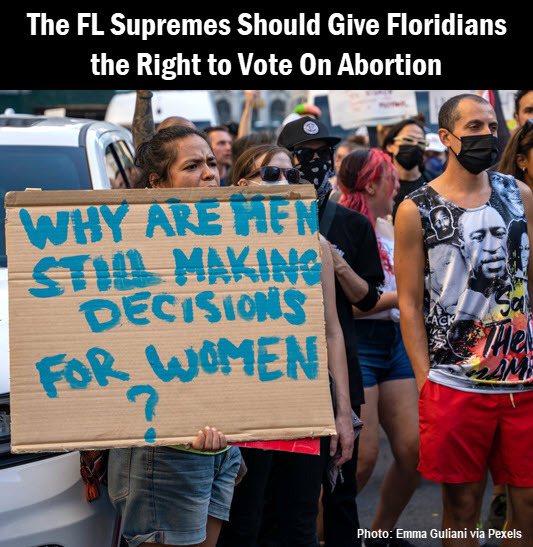Florida Voters Should Have the Right to Vote On Abortion
February 8, 2024 12:30 pm | 3 min read

Wednesday, the Florida Supreme Court heard oral arguments over whether an amendment that would secure reproductive freedom in the Sunshine State should make it onto the November ballot. Remarkably, the court spent little time discussing the thin and unconvincing arguments Attorney General Ashley Moody put forward in her attempt to block the amendment.
That exposes the truth: Moody is asking the court to swing an ax directly at the heart of Floridians’ rights to speak directly to issues that are of utmost importance to them. And she’s done a lousy job of making her case.
Abortion clearly ranks among those issues, and Florida voters have said as much multiple times on previous ballot questions. It's ridiculous to assert, as Moody does, that they don't see the ramifications behind concepts like viability (the point at which an infant can survive outside the womb) along with the definitions of the terms "health care" and "health care provider." Or that they don't understand what this amendment could do.
As Chief Justice Carlos G. Muñiz said: "The people of Florida aren't stupid; they can figure out what this says."
That’s clear to anyone who actually reads the ballot language. It says lawmakers can’t make laws that restrict abortion rights — with two important carveouts. This amendment doesn’t apply to laws that require parental notice when a minor seeks an abortion. And it doesn’t speak to laws that govern abortions post-viability. This tracks with prevailing opinions on abortion. Most Floridians, Republicans and Democrats alike, support the right of adults to make the decision to terminate a pregnancy in the first two trimesters.
Voters deserve the right to make their voices heard. That would be true even if the Florida Legislature didn't seem to be hell-bent on restricting abortion access in every possible way through laws and pending legislation that would ban abortion very early in pregnancy and punish those who attempt to circumvent that ban.
One chilling note
Many observers picked up on a line of questioning Muñiz pursued, touching on what would happen if the Legislature or the high court itself took the massive step of conveying “personhood” on embryos or fetuses.
That’s alarming, given that the question of granting fundamental rights to pre-viability fetuses was not before the court in any way.
Still, even those who oppose abortion should recognize that backers of this amendment have met all the requirements to be on the 2024 ballot.
Because the implications of Moody's argument go far beyond the question of abortion, if the court grants her request, the standard for reviewing ballot questions will shift dramatically.
Under law and precedent, the court should focus on the high barrier that law and precedent have set: Is it shorter than 75 words; does the ballot question address a single subject, and does the summary accurately reflect what the amendment says it would do?
That last question is where Moody focused her argument. She contends that the ballot summary (which, in this case, is nearly identical to the wording that would go into the constitution) is inaccurate because it doesn’t include every possible outcome the amendment might have — and that’s a virtually impossible barrier to overcome, no matter what the subject of a proposed ballot question.
As Justice John Couriel observed, “You’re saying this is a wolf, and a wolf it may be. But it seems our job is to answer whether this is a wolf in sheep’s clothing. That’s all we get to do.”
Let voters decide
The backers of the abortion amendment have met the legal standards to get the question on the 2024 ballot. Those who want to smother the voices of Florida voters are asking the high court to crush that precedent.
“The people of Florida should be able to exercise their voice, and vote on this amendment,” said Courney Brewer, attorney for the group behind the proposed amedment. That’s the issue before the court, and those who oppose it have no credible or legal argument to silence that voice.
*The Orlando Sentinel Editorial Board consists of Opinion Editor Krys Fluker, Editor-in-Chief Julie Anderson, and Viewpoints Editor Jay Reddick. Republished in the public interest. The Orlando Sentinel editorial is available here.
